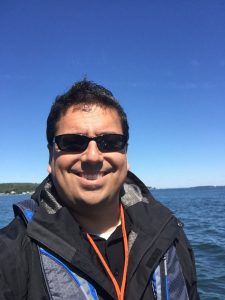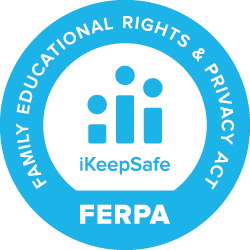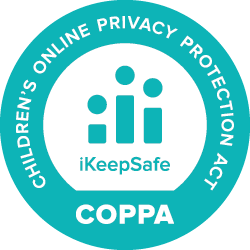Live Event: December 7, 2017 at 1:00pm Eastern (US)
Marcos Sastre-Córdova is an Ocean Engineer at Raytheon where he uses undersea sensor systems technology to develop products that protect the lives of soldiers deployed at-sea.
About Marcos
What are your favorite hobbies or activities you do for fun?
SCUBA diving, fishing, camping, boating
Do you play any musical instruments?
I’ve been heard playing Puerto Rican hand-drums or “panderos”.
Do you play any sports or do any athletic activities?
I enjoy a round of golf every now and then.
What music do you listen to all the time?
Águas de Marҫo (Waters of March) by Antonio Carlos Jobim.

Who do you look up to and admire?
Seth MacFarlane (creator of Family Guy)
Highest degree attained
PhD (Doctor of Philosophy) – Marine Science and Technology
Schools attended
University of Massachusetts
University of Rhode Island
University of Puerto Rico – Mayagüez
Favorite classes/coursework in elementary school, middle school, high school, college
Optics and physics lab.
What educational accomplishments are you most proud of?
Winning science fairs in high school.
What kinds of challenges did you overcome during your education?
Balancing a full-time job, family and graduate studies can be extremely challenging.
Employer
Raytheon Company
Integrated Defense Systems (IDS)
Official title
Sr. Principal Systems Engineer
“Layman’s” title
Ocean Engineer/Technologist
Years in this organization/position
17 years; 3 years in current position.
What does your organization do?
Develop and deliver technologies and systems for the warfighter, both domestically and internationally.
What is your role in the organization?
I work for the “Maritime Domain Systems” department as a “systems analyst.” This role has evolved over time, but presently I am responsible for analyzing the performance of developmental undersea sensor systems and developing technical solutions for future systems.
Describe your work environment
I work in an office setting. I often bring test equipment and instrumentation from the lab and set it up in my office for evaluation and run tests. I’ve been told I have too many “toys” for a “systems” guy. I take that as a compliment!
What tools and/or techniques do you use in your job?
Most of the work I do requires a computer, data analysis software (e.g., Matlab®), access to email and an office suite such as Microsoft® Office. I write a lot of reports and prepare technical presentations. On occasion, I get to use tools specifically designed to measure properties of the ocean environment, such as a CTD (Conductivity-Temperature-Depth) profiler and a flow meter to measure water currents.
Describe a typical day in your job
My typical day starts about 8 am. I login to my computer and check email and my calendar. I check in with my teammates and status of ongoing activities. I usually spend about half of my day looking at some sort of data and trying to explain what’s going on. Sometimes is data collected during operation of a system in the field, and other times is looking at sensor data from a controlled experiment, either in the lab or at-sea. At the end of the day, I create a brief write-up of my analysis and summarize key observations and results. End of my work day is typically around 6 pm. However, I have a flexible work schedule so it is not uncommon to work past normal working hours and take the time off at a later date.
Describe an atypical day in your job
Every time I get to bring a system out to sea for an in-field experiment or performance test. It is pleasant to do this in the summer, but we’ve been out in the middle of winter too and have had to wipe down snow and ice from equipment before deploying. We don’t get to do this often, so I consider myself lucky to break the routine and help plan, conduct and often lead these kinds of activities. It beats a day in the office!
How is the work you do important to society?
We take technology that has been developed at the government labs and universities and take it to the next level by developing products that protect the lives of our soldiers deployed at-sea keeping our nation safe.
What accomplishments are you most proud of in your current role?
I was recently awarded a contract by the Office of Naval Research (ONR) to develop undersea navigation technology. This was the very first time in my career I got to conceive, build and test a prototype system of my own and serve as a Principal Investigator (PI) on a project. I hope we get to mature this technology further and integrate it into one of our product lines in the near future.
What projects or goals are you currently pursuing?
I am currently working on a development project for a hydrophone array that will dramatically improve our ocean surveillance capability against enemy submarines. I am also part of a team working on the next generation mine neutralization vehicle: a low-cost undersea robot that will be able to clear minefields at a much higher rate than ever before.
What are the biggest challenges you face in your work?
Availability of internal Research and Development (R&D) funds. Getting an idea funded for R&D is very competitive and finding time to pursue these ideas can be extremely challenging.
What is the most exciting, most amazing, or scariest thing that has happened to you during your work?
Being part of an annual naval exercise on board the USS John S. McCain off the coast of Okinawa, Japan.
Previous employers and positions that have lead to your current role
NASA Kennedy Space Center – Summer Intern
Upward Bound TRIO program – Physics/Math Tutor
Best job you’ve ever had and why
Graduate student research assistant (RA) at the Department of Marine Sciences of the University of Puerto Rico. I was the system administrator of the bio-optical oceanography lab. I had a great advisor and group of colleagues and stunning views of the Southeastern Caribbean Sea from our premiere vantage point at the top of the main administration building in Isla Magueyes. Some of my best school years, for sure!
What were you like as a kid?
A bit of a day dreamer and not particularly self-confident.
Favorite books/shows/movies when you were a kid?
Rocky (1976), Superman (1978) and Back to The Future (1985).
What did you think you were going to be when you grew up at age 12? At age 15? At age 18?
Age 12, I thought I wanted to be a “Marine Biologist” after a family trip to Sea World Orlando. At age 15 I thought I could work in movies as a director or a stunt man. By age 18, I was pretty sure I would work in a scientific or engineering field.
When did you know you wanted to pursue your current career, and what drove you towards it?
Science fair was a big part of my career choice. If it wasn’t for it I wouldn’t have discovered that I enjoyed working experiments and presenting results; this is a big part of what I do. The interest in ocean technology came much later after I completed a degree in physics and was accepted in the graduate program for physical oceanography. Oceanographers use a lot of cool “toys” to sample and study the ocean… I became more interested in the inner workings of the instruments than the science itself, which drove me to pursue a job in engineering working with sonar (underwater sound) technology.
Who inspired you on this path?
My parents. They always supported and encourage me to pursue advanced studies.
What did you believe about this career before entering into it that proved to be different once you were in?
Time to market. I thought the transition of technology from lab to field would be a lot faster. It turns out, it takes a very long time before something that seems feasible in the lab becomes mature enough to be delivered as a product.
If you weren’t doing what you’re doing now, what other career(s) might you have pursued?
Myth Buster.
What advice would you give a student interested in pursuing your career?
Stay technical. Many young scientist/engineers enter a career that steers them away from maturing and growing their technical skills. It doesn’t have to be that way. Play to your strengths and use what you learned in school.
What advice would you give students in general?
Find your groove. It takes time but give a fair shot to every learning opportunity you are presented with. Even if it doesn’t look that appealing at first, you might be surprised at what you might discover about yourself when you are forced into something that you might have not otherwise tried do on your own.
What are some interesting places you’ve traveled?
Tokyo is a fascinating city filled with light, people, and order.


